Enterprise Blockchain Solutions: Ultimate Guide for Business 2025
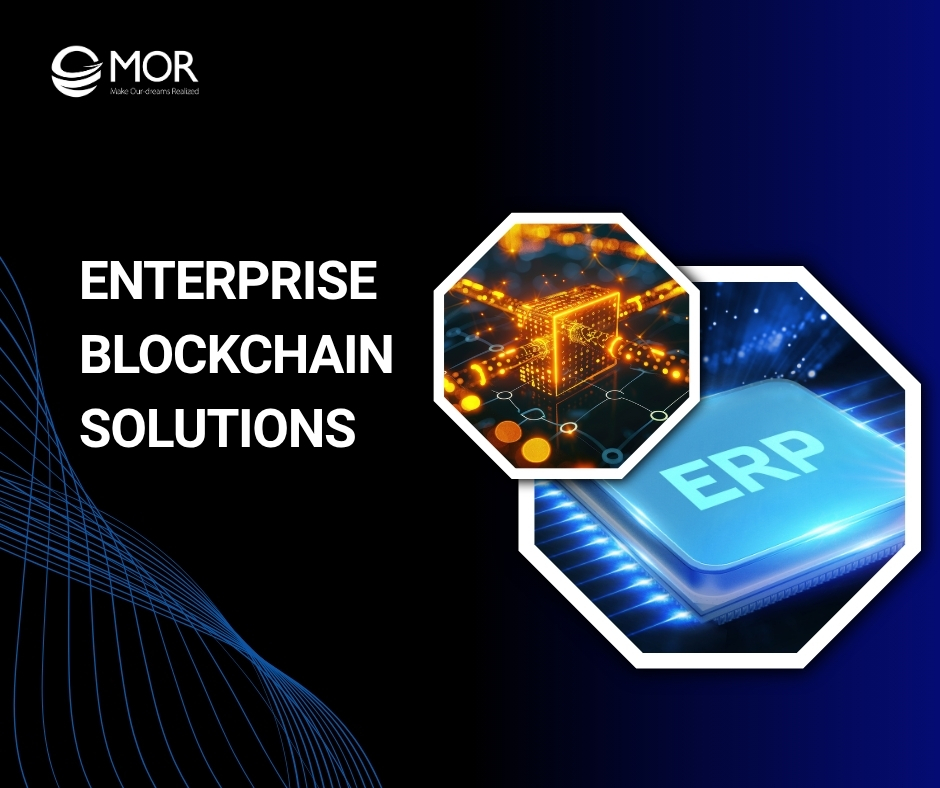
As businesses look for smarter and more secure digital systems, enterprise blockchain solutions are emerging as a trusted foundation for transparency and efficiency. Across industries, blockchain for enterprises is transforming how organizations manage data and automate operations. In this guide, MOR Software reveals how enterprise blockchain drives real business value and what it takes to build scalable, future-ready solutions.
What Are Enterprise Blockchain Solutions?
Enterprise blockchain solutions are tailored versions of blockchain technology built for business environments. Instead of being open to everyone like public blockchains such as Bitcoin or Ethereum, these systems are usually private and permissioned, designed to support secure collaboration and data management among trusted participants. It is also a fast-growing category, with analysts projecting the enterprise blockchain market to rise from about $9.6 billion in 2023 to roughly $146 billion by 2030.
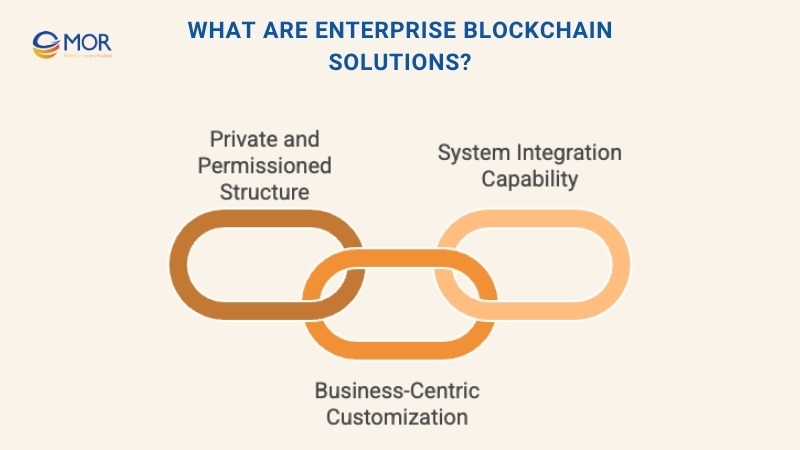
The goal is to solve business challenges, improve operational efficiency, and create transparent ecosystems where multiple parties can exchange information safely and instantly.
- Private and Permissioned Structure: Most enterprise blockchain systems limit access to authorized users only. Each participant is verified before joining, which guarantees privacy, builds trust, and protects sensitive business data during transactions. In luxury goods, one permissioned consortium has already logged more than 70 million products across over 50 brands, showing how verified access can scale in practice.
- Business-Centric Customization: Every blockchain for the enterprise is designed with specific goals in mind, from logistics tracking to digital payments and patient record management. Its flexibility allows businesses to shape the network around their workflows, ensuring relevance and measurable outcomes. Markets focused solely on supply chain traceability already exceed $3.55 billion in 2025, with forecasts pointing to growth above 31 percent annually from 2026.
- System Integration Capability: Modern blockchain in the enterprise solutions connect easily with existing ERP, CRM, and analytics platforms. This smooth integration makes it simpler for companies to adopt new systems without interrupting day-to-day operations. In shipping pilots, integrated shared ledgers have trimmed documentation costs by around 20% and shortened door-to-door times by up to 40%.
In short, enterprise blockchain solutions turn decentralized technology into a practical business tool, offering both innovation and control for organizations ready to embrace secure digital collaboration.
How Do Enterprise Blockchain Solutions Work?
Enterprise blockchain solutions reshape how organizations record, share, and verify data. Instead of relying on a single authority, this technology distributes trust across a secure network, making data tampering nearly impossible. It’s a foundation that helps businesses build transparency, streamline processes, and protect valuable information. For example, real-world assets worth roughly $85 billion have already been tokenized on public ledgers, showing how quickly adoption is growing.
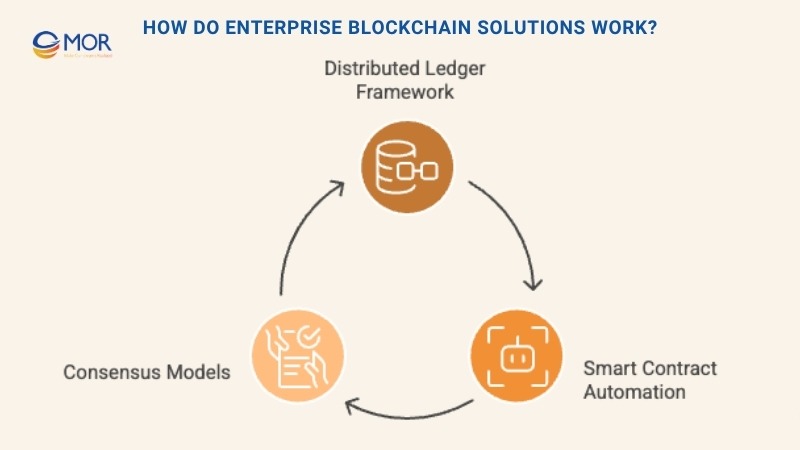
- Distributed Ledger Framework: Every transaction in an enterprise blockchain is stored across multiple nodes using distributed ledger technology (DLT). This shared record removes single points of failure, improves reliability, and ensures that all participants view the same verified data. In supply chain deployments, cloud delivery already accounts for roughly six in ten installations, reflecting how DLT is being adopted through existing IT stacks.
- Smart Contract Automation: Smart contracts run predefined business rules automatically. They execute transactions, enforce agreements, and remove the need for intermediaries. For companies managing complex supply chains or financial workflows, these contracts speed up processes and cut manual errors. Spending here is scaling quickly, with the smart-contracts market projected to grow from about $2.1 billion in 2024 to roughly $12.6 billion by 2032.
- Consensus Models for Businesses: Private blockchain networks rely on algorithms like Practical Byzantine Fault Tolerance (PBFT) and Proof of Authority (PoA). These models give enterprises faster transaction times and stronger control, balancing security and performance across the network.
With enterprise blockchain solutions, companies gain a trusted system for collaboration, automation, and compliance that fits seamlessly into existing business ecosystems and supports long-term digital transformation.
Key Benefits Of Enterprise Blockchain Solutions
Adopting enterprise blockchain solutions brings measurable advantages across industries, from finance to manufacturing. These systems enhance security, promote transparency, and improve efficiency in managing digital operations.
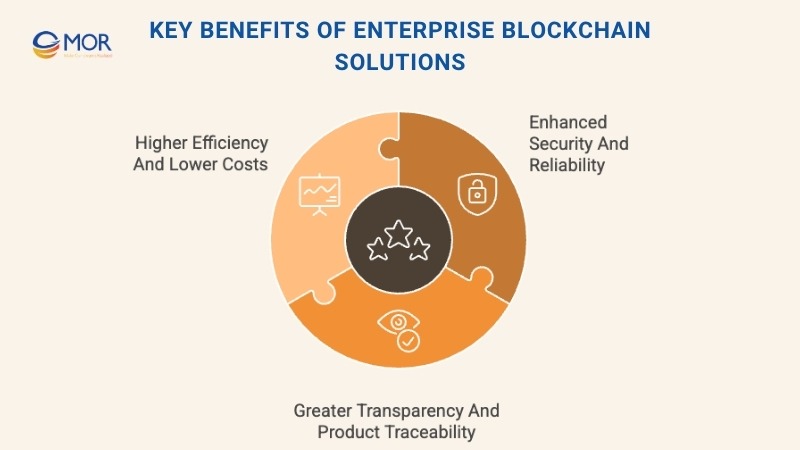
- Enhanced Security and Reliability: With their decentralized architecture, enterprise blockchain benefits include protection against tampering and unauthorized access. Each transaction is encrypted and verified across nodes, creating a trusted environment for storing sensitive data and preventing fraud. Analysts at McKinsey also note that distributed ledgers can lower compliance and transaction costs when properly implemented, showing the security-plus-efficiency case for adoption.
- Greater Transparency and Product Traceability: Every entry on a blockchain ledger is timestamped and immutable. This feature boosts accountability and traceability across workflows, which is vital for sectors like logistics and supply chain management that depend on real-time visibility.
- Higher Efficiency and Lower Costs: Through automation and reduced dependency on intermediaries, blockchain for enterprises improves transaction speed while cutting administrative costs. Smart contracts remove repetitive tasks and help teams focus on high-value work.
In essence, enterprise blockchain solutions create a foundation where trust, transparency, and performance work together to support business growth and long-term sustainability.
How Enterprise Blockchain Solutions Differ From Other Blockchain Types
The biggest distinction between enterprise blockchain solutions and public networks lies in their flexibility and focus on business automation. While public chains like Bitcoin are limited to basic transactions, enterprise systems are built to support complex operations and large-scale collaboration.
A defining element of blockchain enterprise technology is its built-in smart contract capability. These programmable contracts automate workflows, enforce agreements, and trigger actions without human oversight. This makes them indispensable for industries that depend on precision and real-time coordination, from finance to logistics.
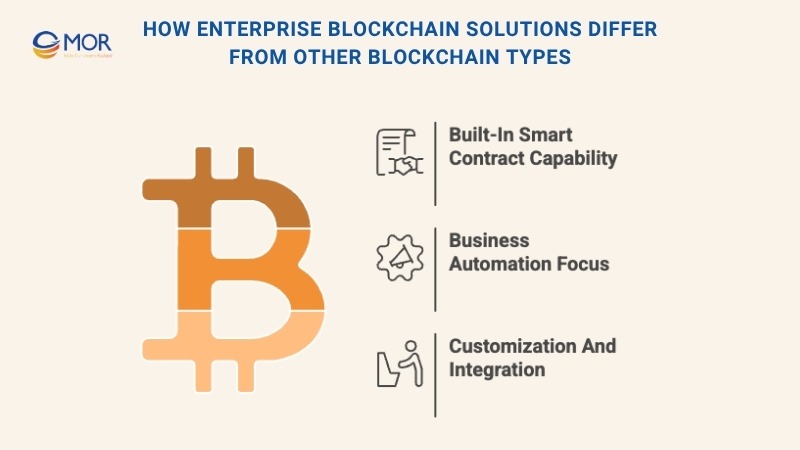
Public blockchains, on the other hand, often lack the adaptability enterprises require. Bitcoin, for example, allows users to send and store digital assets but offers little room for building business-grade applications. Some projects like RSK have tried adding smart contract functionality, yet they still fall short of what a true enterprise blockchain development company can deliver in customization, control, and integration.
In short, enterprise blockchain solutions transform blockchain from a transaction tool into a full-scale business engine, one that supports automation, scalability, and secure ecosystem growth.
Main Types Of Blockchain Networks For Businesses
Not every blockchain operates the same way. Several network models exist, each offering unique structures for data sharing, governance, and access control. Understanding these distinctions helps organizations choose the right foundation for their enterprise blockchain solutions.
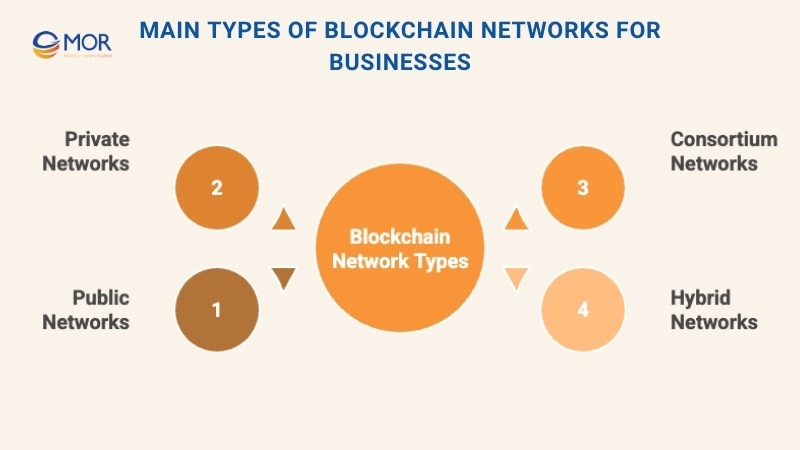
Public (Permissionless) Networks
A public blockchain is an open network where anyone can join, validate transactions, or build applications without prior approval. These networks, such as Ethereum, Cardano, and Polkadot, are maintained by a global community of participants who collectively verify every transaction.
Because of their transparency, public blockchains are ideal for projects that prioritize openness and community validation. However, they may not fit all enterprise needs, especially when privacy and compliance are required. Bitcoin and Litecoin are examples of public chains that, while decentralized, lack advanced smart contract functions often needed in enterprise blockchain use cases.
For businesses seeking scalable collaboration tools, public blockchains serve as an important reference point in understanding how distributed systems operate, but enterprise environments often demand more structure and control.
Private (Permissioned) Networks
A private blockchain, also known as a permissioned network, is built and governed by a specific organization or consortium. Access is restricted, meaning only approved participants can join and interact within the system. This structure allows tighter control over governance, data privacy, and security, making it a preferred model for many blockchain in the enterprise applications.
In this setup, a business can create its own blockchain from scratch, developing the core software, setting up nodes, and managing the infrastructure internally. Such an approach provides full customization and autonomy but requires substantial investment in talent, infrastructure, and energy resources.
While the centralized oversight of private networks can raise questions about transparency and decentralization, these systems remain highly valuable for regulated industries like finance, healthcare, and government, where compliance, confidentiality, and accountability are top priorities.
Consortium Or Federated Networks
A consortium blockchain is a shared network jointly operated by multiple organizations that collaborate to maintain and govern the system. Unlike a private blockchain, where control belongs to a single entity, consortium models distribute authority among selected members. This approach fosters cooperation and trust across businesses that share mutual goals, making it ideal for enterprise blockchain adoption in complex industries.
Joining a consortium network typically requires approval from existing members through a formal process, often involving votes or board decisions. This ensures that only trusted participants are granted access, preserving the integrity of shared data and governance.
Well-known examples include R3 Corda, Hyperledger Fabric, and B3i. R3, formed in 2014, unites over 100 major global financial institutions such as HSBC, Barclays, and Citi. Hyperledger, backed by the Linux Foundation, brings together technology leaders like IBM, Cisco, and Accenture. Meanwhile, B3i focuses on insurance, linking firms such as Allianz, AXA, and Swiss Re to solve long-standing operational challenges through blockchain collaboration.
These consortium models highlight how enterprise blockchain solutions can thrive through shared innovation, balancing transparency, scalability, and security across multiple organizations.
Hybrid Networks
Hybrid blockchains combine the openness of public networks with the control of private systems, creating a flexible model that suits both transparency and confidentiality needs. In this structure, organizations operate private blockchains connected to a larger public network, gaining the best of both worlds, security from decentralization and privacy from restricted access.
Each private chain, often referred to as a subnetwork or sidechain, is accessible only to authorized participants but still benefits from the broader network’s validation and resilience. This architecture makes hybrid models especially attractive for enterprises managing sensitive data while needing verifiable public audit trails.
Platforms like Polkadot and Kusama are prime examples. They enable businesses to build customized private chains, called parachains, on top of their public frameworks. This setup helps organizations maintain independence while still leveraging the strength, scalability, and enterprise resource planning potential of a connected blockchain ecosystem.
Hybrid networks are quickly becoming a cornerstone in enterprise blockchain solutions, bridging the gap between openness and control for modern digital enterprises.
Key Features Of Enterprise Blockchain Solutions
Enterprise blockchain solutions are built to help organizations manage data, automate transactions, and collaborate securely across digital ecosystems. What sets them apart from public blockchains is their balance of transparency, control, and performance, all essential for real-world business operations.
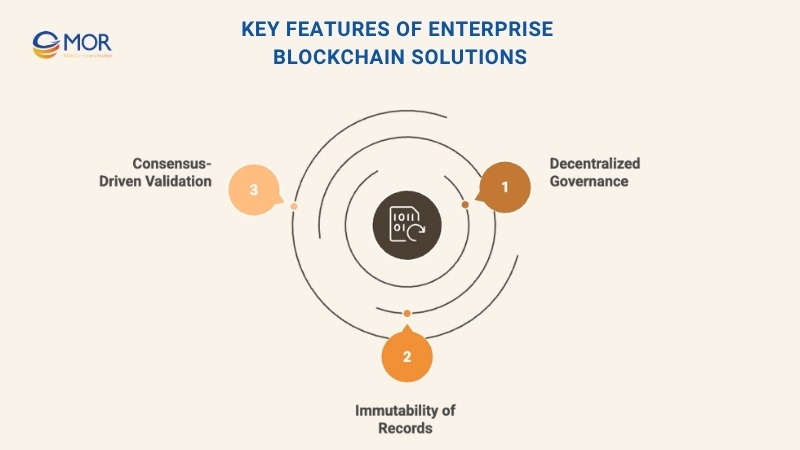
- Decentralized Governance: Control and validation are shared among trusted participants rather than concentrated in one central body. This structure strengthens accountability, improves collaboration, and minimizes the risk of manipulation within corporate networks.
- Immutability Of Records: Once a transaction is confirmed, it becomes a permanent entry in the ledger. If an adjustment is required, it’s logged as a new entry rather than replacing the old one. This ensures traceability and reliability in every recorded event.
- Consensus-Driven Validation: Every blockchain enterprise system operates under specific consensus rules that require multiple parties to approve transactions. This collective verification promotes transparency and security across all operations.
Because of these attributes, enterprise blockchain solutions support businesses that need scalable, private, and compliant digital systems, turning blockchain into a practical foundation for enterprise-grade innovation and governance.
Industries Benefiting From Enterprise Blockchain Solutions
Across sectors, enterprise blockchain solutions are transforming how organizations exchange data, verify transactions, and build trust. From manufacturing to healthcare, these systems introduce security, traceability, and automation that traditional databases cannot match.
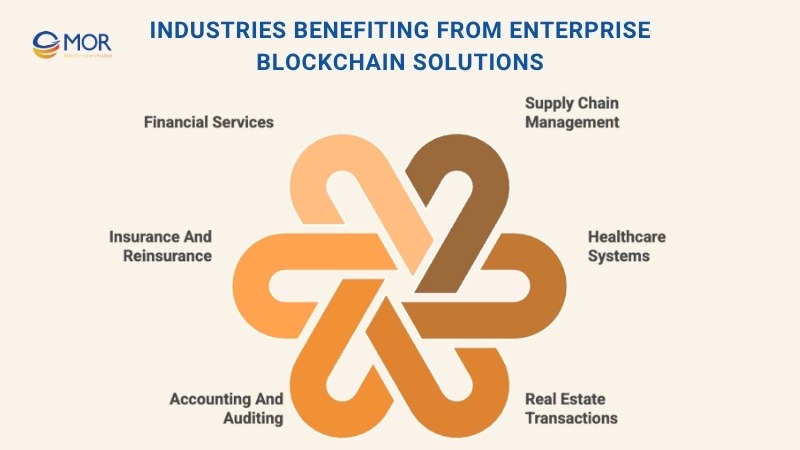
Supply Chain Management
Few areas show the value of enterprise blockchain better than supply chain management. Products today travel across continents and through countless intermediaries before reaching consumers. Each step introduces the risk of fraud, inefficiency, and rising costs.
Using distributed ledger technology, blockchain for the enterprise creates a transparent record of every transaction and product movement. Each stakeholder, from manufacturer to retailer, can verify data authenticity without relying on third parties. The ledger’s immutability ensures that once information is logged, it cannot be altered, reducing the circulation of counterfeit goods and building consumer trust.
Smart contracts further automate trade financing, order fulfillment, and supplier agreements. This reduces overhead and improves coordination among global partners, turning the supply chain into a connected, trustworthy ecosystem powered by the business blockchain.
Healthcare Systems
Healthcare depends heavily on accurate, secure, and shareable data. Doctors, pharmacists, and nurses all rely on patient records to make timely decisions, but in most traditional systems, this information is scattered across disconnected databases. That fragmentation leads to delays, repeated tests, and gaps in patient history.
Enterprise blockchain solutions address these issues by creating a unified, encrypted ledger for storing and sharing medical information. Each record is linked to a patient-controlled digital identity, allowing individuals to grant and revoke access as needed. This empowers patients to move freely between providers while keeping full ownership of their health data.
When a patient visits a new doctor, their consent key unlocks limited access to their medical history. Updates are written to the blockchain instantly, ensuring continuity of care and a complete view of treatment progress.
For hospitals and research institutions, this setup lowers administrative costs and strengthens security. Because the data is decentralized and immutable, large-scale breaches become far less likely. In turn, blockchain in business analytics for healthcare helps detect patterns, predict risks, and support research, all while maintaining privacy and compliance.
Real Estate Transactions
Property deals often involve multiple intermediaries, brokers, banks, registries, and legal offices, all adding time and cost to the process. With enterprise blockchain solutions, these steps can be simplified into a secure, transparent digital workflow.
Each property can be assigned a verified digital identity on the blockchain, often represented as a non-fungible token (NFT). This token acts as proof of ownership and can be instantly verified or transferred without relying on third parties. Buyers and sellers can complete transactions through smart contracts, which automatically exchange funds and property titles once conditions are met.
Beyond sales, blockchain for enterprises is also transforming rental systems. Smart contracts can issue digital keys that automatically deactivate once a lease ends or payments stop, reducing administrative overhead and fraud.
Through digitizing property assets and agreements, enterprise blockchain solutions cut costs, increase trust, and create a faster, more reliable real estate market that works seamlessly for all parties involved.
Accounting And Auditing
Modern accounting systems are built for accuracy and transparency, yet they remain vulnerable to manipulation or human error. Enterprise blockchain solutions introduce an added layer of trust by storing financial records on immutable ledgers that cannot be altered once confirmed.
Each transaction is time-stamped, verifiable, and accessible to authorized users in real time. This transparency streamlines audits and compliance while preventing unauthorized adjustments to data. For auditors and regulators, blockchain provides a single, tamper-proof source of truth that enhances the reliability of financial reporting.
Insurance And Reinsurance
Fraud continues to cost the global insurance industry billions each year, making automation and trust critical challenges. With enterprise blockchain adoption, insurers can create secure, traceable systems where all participants, policyholders, insurers, and reinsurers, share access to the same verified data.
Smart contracts automate claims and payouts based on predefined rules, cutting down manual processing and dispute risks. Meanwhile, the immutable nature of blockchain for enterprises ensures complete transparency across underwriting, policy management, and reinsurance activities.
The result is a more efficient, fraud-resistant insurance ecosystem that strengthens accountability and trust among all stakeholders.
Financial Services
Traditional financial systems have long struggled to reach everyone. Despite years of innovation, billions of adults still remain unbanked due to high infrastructure costs and limited access. Enterprise blockchain solutions offer a path toward financial inclusion by reducing dependence on intermediaries and enabling direct, transparent transactions.
With decentralized systems, users can send, receive, and manage funds securely without relying on traditional banks. Smart contracts handle settlements instantly, eliminating processing delays and excessive fees. This structure helps institutions serve broader audiences while maintaining compliance and auditability.
Enterprises are also exploring business opportunities in blockchain through decentralized finance (DeFi) platforms. These applications replicate core banking functions, such as lending, saving, and currency exchange, within secure, automated networks. By integrating blockchain into traditional operations, financial institutions can lower barriers, reach new markets, and deliver services faster and more cost-effectively.
Top Enterprise Blockchain Solutions For Modern Businesses
Among today’s platforms, several stand out for their scalability, adaptability, and enterprise-grade architecture. Below is one of the most prominent examples shaping how organizations use enterprise blockchain solutions to drive innovation and efficiency.
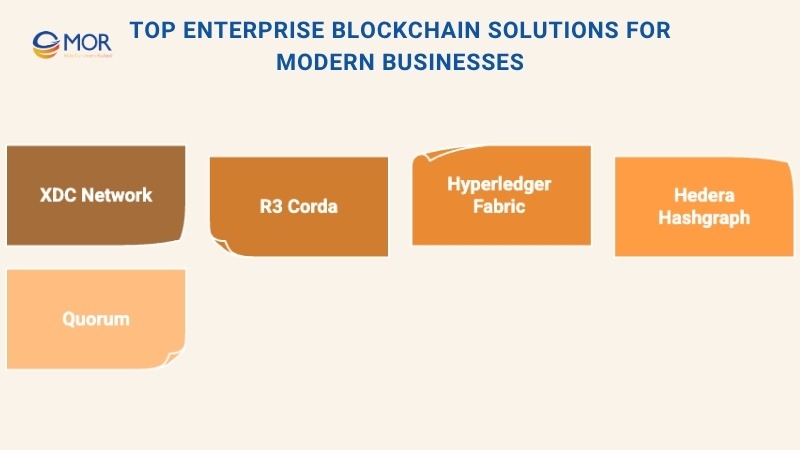
1. XDC Network
The XDC Network is a hybrid blockchain built for business, combining the transparency of public chains with the control of private systems. Developed on the XinFin Hybrid Blockchain framework, it offers high speed, interoperability, and reliability, qualities essential for enterprise-scale operations.
Consensus Model
XDC uses a Delegated Proof-of-Stake (DPoS) consensus mechanism, allowing rapid transaction validation and energy-efficient performance. Validators, trusted block producers, ensure network integrity while keeping costs and processing times low.
Scalability And Performance
Designed for global trade and finance, the network handles thousands of transactions per second through a multi-chain architecture. This design ensures smooth performance even under high-volume enterprise workloads.
Interoperability
Cross-chain compatibility enables XDC to connect with other networks, facilitating seamless data and asset transfers between blockchain ecosystems. This interoperability supports flexible integration across various enterprise blockchain use cases.
Smart Contracts And Tokens
The platform supports Solidity-based smart contracts, allowing developers to automate transactions and enforce digital agreements easily. Its native token, XDC, powers governance, staking, and transaction fees within the ecosystem.
Governance And Enterprise Focus
Managed by the non-profit XDC Foundation, the network maintains transparent governance and long-term sustainability. Its enterprise-grade focus suits industries like supply chain, trade finance, and cross-border payments, areas that benefit most from secure and transparent blockchain for enterprises.
2. R3 Corda
Developed by the global consortium R3, Corda is one of the most recognized enterprise blockchain solutions in finance, banking, and trade. It’s built to enable secure, private, and scalable transactions between verified participants, making it a preferred platform for regulated industries that demand confidentiality and precision.
Privacy And Security
Unlike public networks, Corda does not broadcast transactions to all participants. Data is shared only with the parties involved, protecting sensitive financial information. Cryptographic validation ensures every record remains accurate and tamper-proof, building strong trust among enterprise users.
Flexible Consensus
Corda supports a pluggable consensus model, giving organizations the freedom to choose mechanisms that align with their operational and compliance needs. This flexibility makes it ideal for institutions that require control over data governance and validation processes.
Smart Contracts And CorDapps
Corda allows developers to write smart contracts, known as CorDapps, in languages like Java and Kotlin. These applications automate agreements, settlements, and workflows, reducing manual effort while maintaining transparency and accountability.
Verified Network Identity
Each participant in the blockchain enterprise network is identified and authenticated, ensuring that only authorized members can transact. This model enhances compliance and traceability, which are critical in financial services and trade.
Integration And Interoperability
Corda’s architecture enables seamless integration with existing enterprise systems, databases, and other blockchain platforms. This interoperability supports enterprise resource planning and cross-industry collaboration without disrupting legacy infrastructure.
Global Corda Network And Governance
The Corda Network connects organizations across industries under a permissioned model that promotes collaboration, communication, and shared standards. Governance is managed by the R3 consortium, which includes over 100 financial and technology institutions worldwide.
Corda remains a benchmark for enterprise blockchain solutions, offering a trusted framework for building decentralized applications that prioritize privacy, efficiency, and real-world business utility.
3. Hyperledger Fabric
Hyperledger Fabric is an open-source enterprise blockchain solution developed by the Linux Foundation under the Hyperledger project. Known for its flexibility, scalability, and strong governance model, Fabric is one of the most widely adopted frameworks for building private, permissioned blockchain systems in business environments.
Permissioned Architecture
Fabric operates as a private, permissioned network where every participant is identified and verified. This structure ensures confidentiality and regulatory compliance, making it ideal for industries like finance, logistics, and healthcare that handle sensitive data.
Modular And Scalable Design
Fabric’s modular architecture separates critical components such as consensus, smart contracts, and membership management into distinct layers. This design allows organizations to customize configurations, scale easily, and maintain high system performance as their network grows.
Consensus Flexibility
Fabric supports pluggable consensus mechanisms, allowing enterprises to choose models like Raft or Practical Byzantine Fault Tolerance (PBFT) based on their performance and trust needs. This adaptability gives businesses full control over how transactions are validated and recorded.
Chaincode Smart Contracts
Unlike traditional blockchains, Fabric uses chaincode to define business logic. Written in Go, JavaScript, or Java, chaincode enables secure execution of processes across distributed networks, providing the flexibility needed for advanced automation in enterprise blockchain development company projects.
Privacy Through Channels
One of Fabric’s standout features is the use of channels, private sub-networks within the main blockchain. Channels allow selective data sharing among specific participants, ensuring sensitive information stays protected while maintaining network-wide transparency.
Identity And Membership Management
Fabric seamlessly integrates with enterprise identity systems, using public key infrastructure (PKI) to authenticate members and manage roles. This tight control over identity and access adds another layer of trust to every transaction.
Open Governance And Collaboration
Governed by the Linux Foundation, Hyperledger Fabric thrives on a global open-source community that encourages innovation and collaboration. Its enterprise-grade reliability, modular framework, and strong privacy features make it a top choice for businesses developing secure, scalable blockchain for the enterprise solutions.
4. Hedera Hashgraph
Hedera Hashgraph is a next-generation distributed ledger platform often categorized alongside enterprise blockchain solutions, though it uses a unique underlying technology instead of traditional blocks. Its innovative Hashgraph algorithm delivers faster, more secure, and energy-efficient consensus, making it highly suitable for enterprise-grade applications and digital asset management.
Consensus Algorithm
Rather than relying on proof-of-work or proof-of-stake, Hedera uses a hashgraph consensus algorithm that blends a gossip protocol with virtual voting. This method enables participants to reach agreement on transaction order quickly and efficiently, achieving consensus without heavy computational costs.
Directed Acyclic Graph (DAG) Architecture
Hedera organizes data using a Directed Acyclic Graph (DAG) rather than sequential blocks. This structure allows multiple transactions to be processed in parallel, dramatically improving throughput and responsiveness compared to linear blockchain systems.
Speed And Scalability
The combination of the DAG structure and the hashgraph consensus algorithm allows Hedera to process thousands of transactions per second with near-instant finality. This speed makes it a practical choice for real-time business processes and payment systems built on blockchain for the enterprise principles.
Security And Reliability
Hedera achieves asynchronous Byzantine Fault Tolerance (aBFT), one of the highest standards of network security. Even if part of the network behaves maliciously, the system remains safe and reliable. All transactions are cryptographically signed, guaranteeing integrity and authenticity across the network.
Governance And Council
The Hedera Governing Council, made up of global enterprises such as IBM, Google, and Boeing, manages updates, decision-making, and network stability. This decentralized governance ensures fair representation and consistent development of the platform.
Public And Private Flexibility
Hedera supports both public access and private permissioned deployments, offering flexibility for corporate users who require control over data privacy and compliance.
Tokenization And Smart Contracts
The platform provides tools for token creation, transfer, and tracking, allowing organizations to launch secure digital assets or manage internal economies. It also supports Solidity-based smart contracts for automating business logic and agreements.
Hedera Hashgraph stands out for its blend of security, speed, and governance, giving enterprises a scalable alternative to traditional blockchains and a dependable infrastructure for enterprise blockchain solutions in the modern digital economy.
5. Quorum
Quorum is an open-source enterprise blockchain solution initially developed by J.P. Morgan to meet the privacy, speed, and compliance demands of financial institutions. Built on Ethereum’s core framework, it enhances the platform with enterprise-focused features, enabling private, permissioned, and high-performance blockchain networks tailored for business use.
Privacy And Confidentiality
Privacy lies at the center of Quorum’s design. It enables private transactions through confidential contracts and a dedicated privacy layer, allowing selective data sharing among approved members. This ensures sensitive financial or operational information remains visible only to authorized participants.
Permissioned Architecture
Quorum’s permissioned network model gives organizations control over who can join and interact with the system. This setup supports secure collaboration within trusted environments, essential for regulated industries such as banking, insurance, and trade.
Flexible Consensus Options
Enterprises can choose from multiple consensus algorithms, including a customized version of Raft and Ethereum’s Proof of Work (PoW). This flexibility allows businesses to balance speed, energy efficiency, and security based on their operational needs.
Smart Contract Compatibility
Since Quorum supports Solidity, developers can reuse Ethereum-based tools and frameworks to build automated, self-executing agreements. These smart contracts streamline processes like settlements, asset transfers, and compliance verification across blockchain for the enterprise systems.
Seamless Enterprise Integration
Quorum includes robust APIs and developer tools for easy integration with existing databases, identity systems, and enterprise software. This interoperability ensures blockchain functions can be embedded within traditional workflows without disrupting established IT infrastructure.
Privacy Management And Governance
Its advanced privacy management system lets organizations define fine-grained access controls, managing who can view or modify specific data. Governance follows a collaborative model where multiple stakeholders contribute to ongoing platform improvements and decision-making.
With strong adoption in finance, trade, and supply chain operations, Quorum delivers the balance of transparency, confidentiality, and scalability enterprises need. It stands as a benchmark blockchain enterprise framework for institutions prioritizing secure collaboration and regulatory alignment.
Overcoming Challenges In Enterprise Blockchain Implementation
While enterprise blockchain solutions bring transparency, automation, and trust to business operations, implementing them can be complex. Companies must address several technical and organizational barriers before fully realizing blockchain’s value.
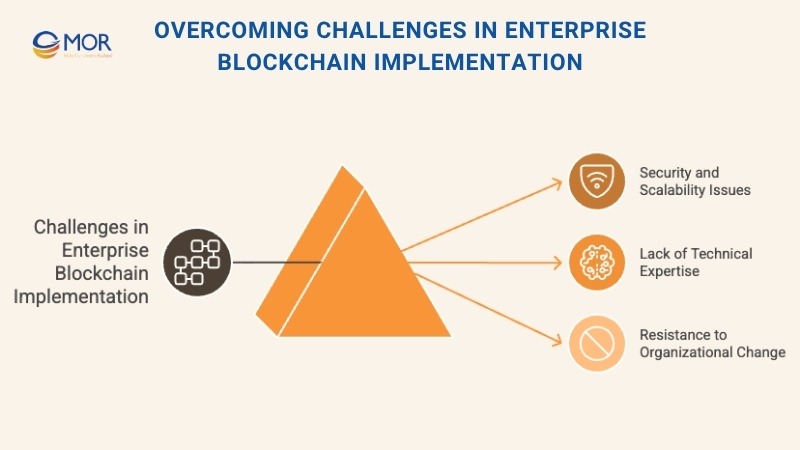
Security And Scalability Issues
Even the most advanced blockchain enterprise platforms can face challenges related to performance and security, especially when dealing with high transaction volumes or sensitive data.
Solution: Collaborate with a trusted enterprise blockchain development company to build tailored solutions with advanced encryption, access control, and scalability frameworks. Expert partners ensure that the network remains secure, compliant, and optimized for enterprise-grade performance.
Lack Of Technical Expertise
Many organizations struggle with limited in-house knowledge about blockchain development, integration, and governance. Without the right talent, deployment can become slow and error-prone.
Solution: Invest in continuous training and professional partnerships to close the knowledge gap. Building internal expertise ensures the team can manage, maintain, and expand blockchain operations effectively.
Resistance To Organizational Change
Transitioning from legacy systems to blockchain requires new workflows, tools, and mindsets. Resistance from stakeholders often delays adoption.
Solution: Start with small-scale pilot projects that demonstrate measurable value, such as cost savings or faster reconciliation. Sharing these early wins helps build confidence across departments, paving the way for broader enterprise blockchain adoption and smoother digital transformation.
Why MOR Software For Enterprise Blockchain Solutions?
MOR Software delivers enterprise blockchain solutions built for real business results. We help organizations move beyond theory with secure, scalable, and practical blockchain systems tailored to their operations. Our teams bring technical skill, industry knowledge, and global experience to every project.
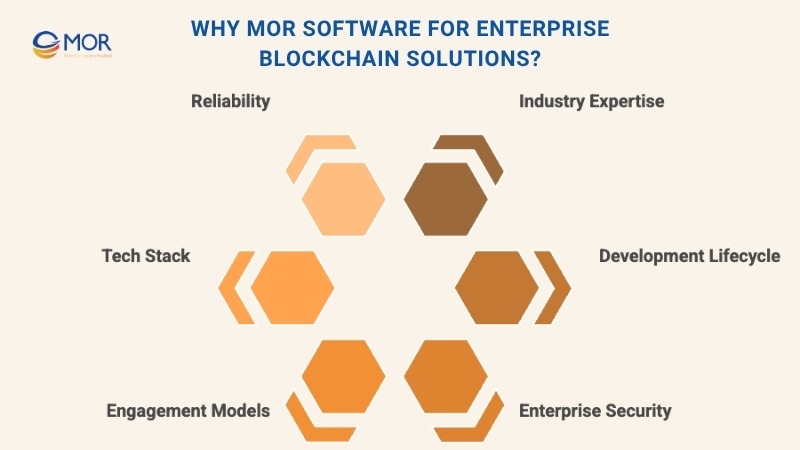
- Proven Industry Expertise: We’ve implemented blockchain across finance, healthcare, manufacturing, and retail. Each solution aligns with business goals and regulatory requirements to deliver measurable value.
- Complete Development Lifecycle: From consultation to maintenance, we manage every step internally. Our process covers analysis, smart contract development, testing, and long-term system support.
- Enterprise-Grade Security: All solutions follow ISO 9001:2015 and ISO 27001:2013 standards. We ensure data protection, compliance, and system resilience from day one.
- Flexible Engagement Models: Choose between offshore, dedicated, or hybrid teams based on your project’s scale and goals. Our agile structure adapts to your timeline and budget.
- Cutting-Edge Tech Stack: We work with Hyperledger, Corda, and Ethereum while integrating AI, IoT, and cloud technologies to create connected and future-ready ecosystems.
- Recognized Reliability: As a Top 10 ICT company in Vietnam and Sao Khue Award winner, we’ve earned trust from global partners across Japan, Singapore, and the U.S.
MOR Software turns blockchain innovation into tangible business performance. If you’re ready to build smarter, more transparent systems, contact us to get started.
Conclusion
Adopting enterprise blockchain solutions is no longer just a technological upgrade, it’s a strategic move toward transparency, security, and efficiency. As more industries embrace blockchain for enterprises, the opportunity to innovate and scale grows stronger. With deep technical expertise and proven global experience, MOR Software helps businesses turn blockchain potential into measurable impact. Ready to unlock smarter, more connected systems? Contact us today to start your blockchain journey.
MOR SOFTWARE
Frequently Asked Questions (FAQs)
What are enterprise blockchain solutions?
Enterprise blockchain solutions are permissioned blockchain systems designed for businesses to securely record, verify, and share data across trusted participants. They improve transparency, automation, and efficiency in multi-party operations.
How are enterprise blockchains different from public blockchains?
Unlike public blockchains that allow anyone to participate, enterprise blockchains restrict access to verified users. This makes them more suitable for corporate environments that require privacy, compliance, and controlled data access.
Which industries benefit most from enterprise blockchain solutions?
Industries such as finance, supply chain, healthcare, insurance, real estate, and manufacturing use blockchain to manage transactions, trace assets, and verify data integrity across partners.
What technologies are commonly used in enterprise blockchain systems?
Popular frameworks include Hyperledger Fabric, Corda, Quorum, and Ethereum. These platforms support smart contracts, permissioned access, and customizable architectures for different business needs.
How do enterprise blockchains enhance data security?
Every transaction is encrypted and stored immutably on a distributed ledger. This decentralized structure prevents data tampering, unauthorized access, and single points of failure.
Can existing business systems integrate with enterprise blockchain platforms?
Yes. Enterprise blockchains can be integrated with ERP, CRM, and other legacy systems through APIs or middleware, allowing data synchronization without disrupting existing workflows.
What challenges do companies face when implementing blockchain solutions?
Common challenges include lack of technical expertise, regulatory uncertainty, high initial costs, and integration complexity. However, these can be mitigated through pilot programs and expert consulting.
How do smart contracts work in enterprise blockchain applications?
Smart contracts are self-executing programs that automate agreements once predefined conditions are met. They remove intermediaries, reduce errors, and accelerate transaction processing across business partners.
Rate this article
0
over 5.0 based on 0 reviews
Your rating on this news:
Name
*Email
*Write your comment
*Send your comment
1